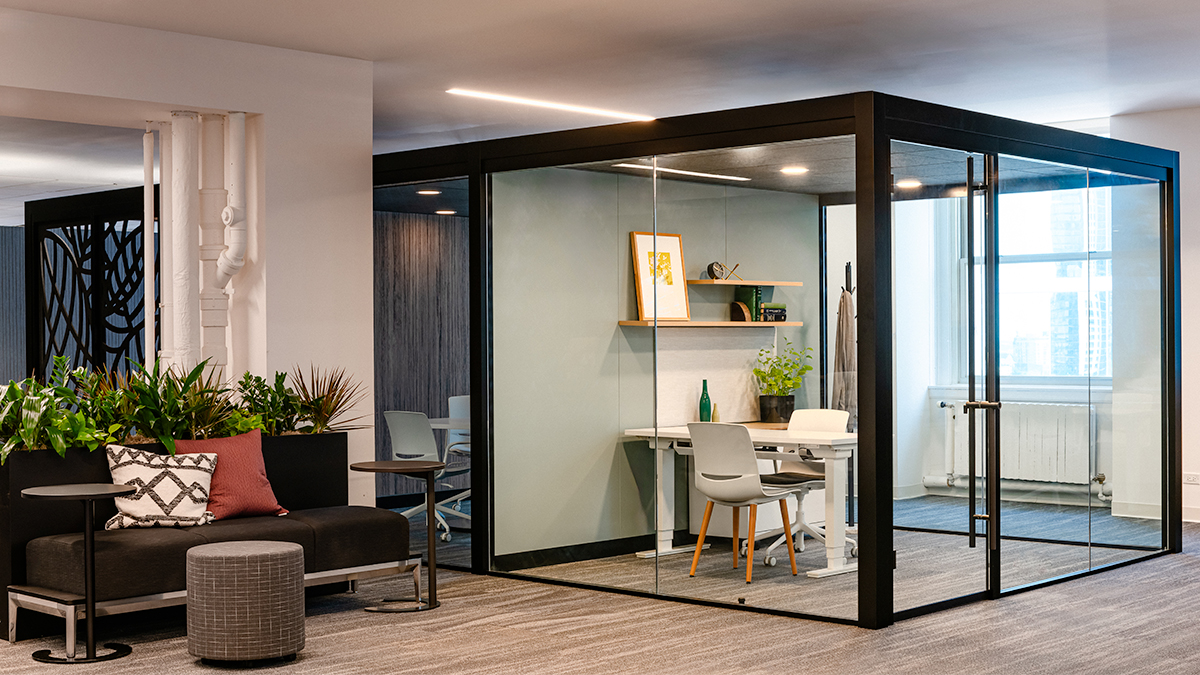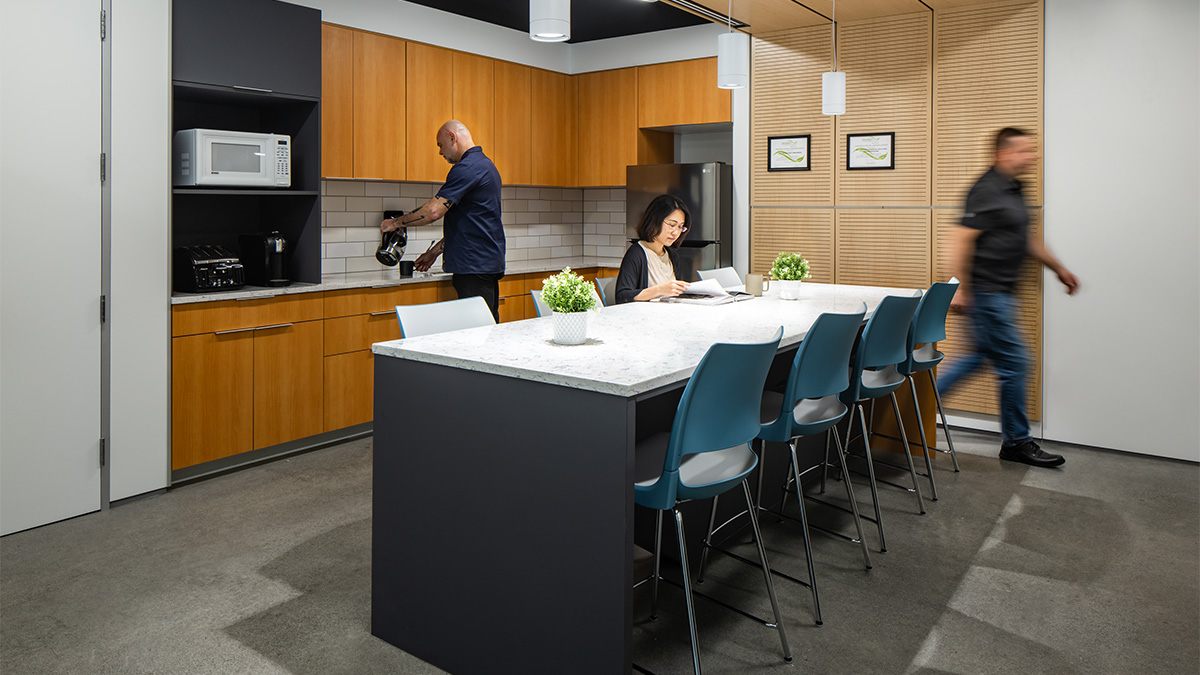- What's New
- Pricing & Purchasing
- Lead Times
- Literature & Samples
- Services & Warranties
- Careers
- Find a Rep
Four Workplace Trends to Watch in 2024

From artificial intelligence to a booming industrial market, here are four workplace trends to watch for in 2024.
Broadly speaking, the workplace has been in flux post-pandemic. We're passionate about analyzing the ongoing evolution of the workplace market and lighting up the office to succeed in these changing times.
At the start of 2023, we took a hard look at how employee well-being, Generation Z entering the workforce, and working from home would affect the workplace. In 2024, we'll continue to keep an eye on remote work and employee well-being. But we'll also be on the lookout for a few newer trends -- like artificial intelligence going mainstream and a looming boom in the industrial workplace market.
1. Employees and Employers Will Compromise on Remote Work
Nearly four years after COVID-19 brought the world to a halt, workplace leaders are more inclined than ever to think it's time for their troops to return to the office. Some have implemented monitoring systems to counteract the growing trend of "coffee badging," where employees show up to the office and return home after putting in just a bit of face time.
Most Americans like to have the option to work from home. But the office isn't going away. According to Forbes, nearly 60% of employees go into the office, or their place of work, every day. Approximately one-third of employees vacillate between in-office and at-home work. Only 12% work from home full-time.
Dressing in athleisure at home and foregoing the commute are nice. But they have a cost. Remote work can disrupt the onboarding process, particularly for new hires and college graduates. A recent Paychex survey found that more than one-third of remote workers didn't have a clear onboarding process. Without one, retaining new hires can be difficult.
2. The Industrial Market Will Continue to Grow
The U.S. industrial market is booming. Pandemic-era supply-chain mishaps motivated companies to bring jobs back to the United States. New legislation, such as the CHIPS and Science Act and the Inflation Reduction Act, have injected federal money into domestic manufacturing. Annual construction spending in manufacturing was $200 billion as of July 2023.
This demand for industrial space has also been driven by e-commerce. And there's no sign of that demand slowing down. E-commerce is expected to experience double-digit growth in 2024 and 2025.
Next year, we expect to see more and more industrial facilities and warehouses built, updated, and outfitted to accommodate the changing ways of digital commerce.
3. AI Will Help Employees Distinguish Themselves
Nearly one-fourth of Americans fear artificial intelligence could make their jobs obsolete, according to a survey from CNBC and SurveyMonkey. The share is even higher among people making less than $50,000 annually, younger workers, and Black, Hispanic, and Asian Americans.
It may seem like artificial intelligence appeared out of nowhere, and now it's everywhere. Overnight, ChatGPT became a household name. But if you're apprehensive about AI, remember that we all have more experience with the technology than we think. Ubiquitous tools from Google Translate to Siri are forms of artificial intelligence.
With this perspective, it's useful to remember the commonly shared idea: AI is not going to replace you as an employee. However, an employee who knows how to use AI is likely to replace an employee who does not.
Viewing AI as a tool rather than a threat reveals its potential to enhance job performance and efficiency. In essence, employees who can adeptly utilize AI could potentially outperform and appear more valuable to employers than those who don't.
4. Employee Well-Being Will Remain a Top Priority
Workplace wellness is more than just a catchphrase. Eight in ten workers said that at least one workplace factor had a negative impact on their mental health, according to a survey from Mind Share Partners in partnership with Qualtrics and ServiceNow.
Employers can make some small but powerful investments to counteract this trend. The most "desired resource," according to the same survey, is simply an "open culture" to discuss mental health and well-being at work.
It's important for employers to emphasize that voicing concerns when problems arise is welcome and expected. By instilling confidence in their employees, employers can empower their teams to advocate for themselves, overcome adversity, and do top-notch work.
Adapting to the Changing Workplace
As we embark on a journey into the year 2024, the landscape of the modern workplace continues to undergo rapid evolution.
The trends we discussed have the potential to shape the future of work in profound ways. They not only reflect the shifting attitudes and preferences of employees but also the strategic responses of organizations as they adapt to these changes. As we navigate these shifts, it's crucial to stay well-informed, adaptable, and proactive.
I invite you to share your own thoughts and observations on these trends. How do you envision them unfolding in your workplace? And what steps are you taking to embrace adaptation and thrive in 2024 and beyond? I look forward to hearing your perspectives. Reach out to me directly at jonathan.webb@ki.com or connect with me on LinkedIn and share your insights on what the future holds for your workplace in 2024.
Related Content
 Blog
Blog
From the economy and hybrid work to employee well-being and Gen Z, these four areas will dynamically shape the future of workplace design.
 Blog
Blog
In this interview with Chief Architect Scott Jensen, discover how Wavetronix prioritizes employee well-being at its new corporate campus.
 Blog
Blog
From an e-commerce boom to a renewed focus on reshoring and investment, explore the key factors fueling growth in the U.S. industrial sector.
Subscribe
Stay up to date with the latest trends and more.










